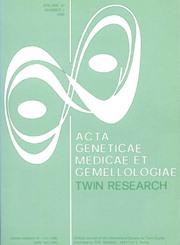No CrossRef data available.
Article contents
Parental Imprinting on Mouse Chromosome 7
Published online by Cambridge University Press: 01 August 2014
Extract
Genetic studies have shown that both a maternally and paternally inherited copy of mouse chromosome 7 are essential for normal embryogenesis. When the parental dosage is altered, such as in maternal or paternal uniparental disomy for chromosome 7 (UPD7), the resulting embryos die. This is due to the altered dosage of imprinted genes which are normally expressed only from the paternally or maternally inherited chromosome homologue. Several genes on mouse chromosome 7 are subject to parental imprinting. Mutant phenotypes seen in UPD7 embryos and chimaeras can be explained by the altered dosage of some of these genes.
The mechanism(s) that causes genes to be expressed in a parental origin specific manner has not yet been determined but is believed to involve germline specific modifications to DNA and/or chromatin which are acted upon after fertilisation to affect the activity of imprinted genes. Two genes, H19 and Igf2, are located 90kb apart on the distal end of chromosome 7 and are imprinted reciprocally with the maternally inherited allele of HI9 and paternally inherited allele of Igf2 being expressed. We have used UPD7 embryos to identify epigenetic modifications that distinguish the two parental alleles in the H19 and Igf2 domain by comparing DNA and chromatin from normal and maternal UPD cobceptuses. Clear cut differences in DNA methylation and chromatin compaction were observed for the H19 gene with the paternal allele exhibiting promoter methylation and nuclease insensitivity. These were not found in sperm. In addition, no major differences were noted for the Igf2 gene, although subtle parental origin specific modifications were found. These studies suggest that the two genes may share a common regulatory mechanism which controls their reciprocal imprinting.
- Type
- Research Article
- Information
- Acta geneticae medicae et gemellologiae: twin research , Volume 45 , Issue 1-2 , April 1996 , pp. 41
- Copyright
- Copyright © The International Society for Twin Studies 1996


